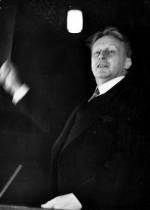
Hans Weisbach (July 19, 1885 - Glogau, Germany - April 23, 1961 - Wuppertal, Germany) The German conductor, Hans Edhar Weisbach, studied at the Hochschule für Musik in Berlin. There he was a pupil of Andreas Moser (1859-1925), a colleague, close friend, and ultimately the biographer of Joseph Joachim. After initially working for a couple of years as a vocal coach under Felix Mottl at the Munich Court Opera, Hans Weisbach settled in Frankfurt am Main, where he became the conductor of the Rühl'scher Gesangverein, thus, starting off as a choral conductor. Weisbach's career led him in the direction of symphonic conducting -- he held conductorships, successively, at Worms, Wiesbaden, Hagen, Barmen, and Düsseldorf (where Professor Herz, as a teenager, sang in the chorus in Matthäus-Passion (BWV 244) under his baton), before assuming the directorship of the Leipzig Radio Symphony Orchestra and Chorus in 1933, a job he held until 1939. From 1939 until the end of World War II, Weisbach was the conductor of the Municipal Orchestra in Vienna. In 1947, he became Music Director at Wuppertal, where he died in 1961. Hans Weisbach was internationally known as a Bach specialist, and, for instance, led the first performance in England of Die Kunst der Fuge, BWV 1080, in 1930; he repeated it, with the London Symphony Orchestra, in each of the ensuing six seasons. He was a fervent advocate of the music of Bruckner as well as that of Bach. Gerhard Herz recalls the performances of Matthäus-Passion (BWV 244) conducted by Hans Weisbach as being characteristic of the traditional mainstream of Bach performance practice in Germany during his youth in the 1920's and 1930's. Fortunately, a concert performance of J.S. Bach's Matthäus-Passion (BWV 244), given under Weisbach's baton in the Altes Gewandhaus in Leipzig on April 19, 1935, has been preserved on records. ****************************
Anton Bruckner
Symphony No. 4 in E Flat Major
Großes Orchester des Reichssenders Leipzig
Hans Weisbach
26.01.1938
**************************** | 
